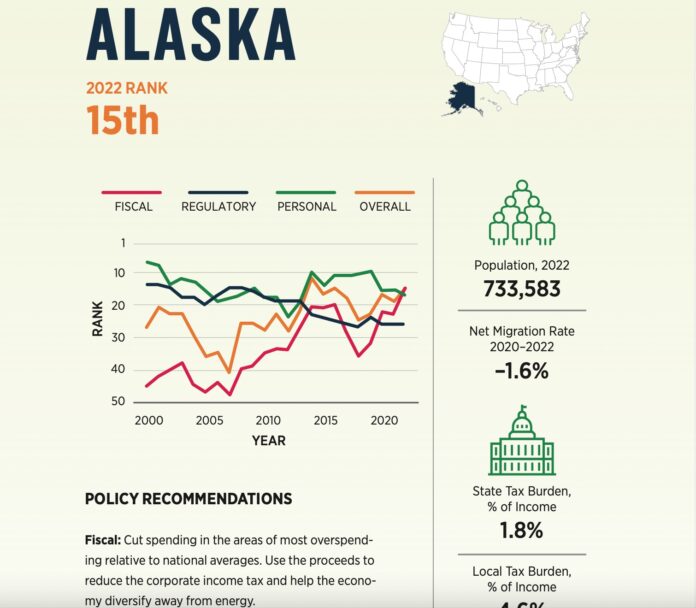New Hampshire is the freest state, according to the 2023 Cato Institute “Freedom in the 50 States” report, and Florida ranks No. 2. Alaska comes in at No. 15. and New York State is at No. 50, the worst in terms of personal freedom. Many of the Democrat-run states are in the bottom tier.
The Washington, D.C.-based libertarian think tank ranks, the 50 U.S. states according to how their public policies affect individual freedoms in the economic, social and personal spheres.
Alaska is an unusual state because of its enormous oil and gas reserves and revenues, the report notes.
Alaska’s fiscal policy “scores fluctuate wildly depending on the global price of oil. With the end of the commodity boom in the 2000s, corporate income tax collections plummeted in Alaska, and the state buffered the decline with large withdrawals from its enormous rainy-day fund. Alaska has one of the highest cash-to-liability ratios of any state. The rise in Alaska’s ranking from 41st overall in 2007 to 15th today is driven entirely by fiscal policy, mostly declining state tax collections because of economic conditions but also real improvement in the size of government,” the study says.
But Alaska’s enviable net asset position has also made for something of a “resource curse” in the state’s expenditures, although Alaska has improved recently on these measures.
Government employment is 17.5 percent, but it was 20 percent in 2002.
“Government consumption is similarly high, but it hit its 21st-century low in 2022. Although local taxes outstrip state taxes, which are the lowest in the country—lately by a wide margin—local jurisdictions are so consolidated that virtually no choice exists among local government options,” the institute reports.
Labor union policies drive Alaska’s scores lower: “The labor market is far more regulated than one would expect for such a conservative state. There is no right-to-work law; the state has strict workers’ compensation mandates and a high minimum wage ($10.85 per hour in 2022). Many occupations are licensed in Anchorage and Fairbanks, where about half of the state’s population lives. Insurance is heavily regulated, and the state adopted a price-gouging law in 2020.”
However, the state gives more practice freedom to nurses and dental hygienists, recognizing full hygienist independent practice in 2022, does not zone out low-cost housing, and has one of the nation’s best civil liability systems, an area in which the state has improved a great deal during the past 25 years, according to Cato.
Personal freedom scores are high due to low drug arrests, legal marijuana, homeschooling freedom, and gun rights.
“The state’s civil asset forfeiture law is among the worst in the country, which probably accounts for why local police do not bother to ask the Department of Justice to ‘adopt’ many cases. The burden of proof is on the owner of the property to prove innocence, property is subject to forfeiture from mere probable cause, and the proceeds largely go to law enforcement. Sales of all alcohol, even beer, are prohibited in grocery stores. Alcohol taxes, especially for beer, are also among the highest in the country. Gambling freedom is low, and the cigarette tax is high at $2 per pack in 2022 ($5 a pack in Juneau). There is almost no school choice at all,” the report notes.
See Cato’s Freedom in the 50 States report here.
The 2023 edition updates and expands on the six previous editions of Freedom in the 50 States, examining state and local government intervention across various policy categories – from taxation to debt, from eminent domain laws to occupational licensing, and from drug policy to educational choice.
